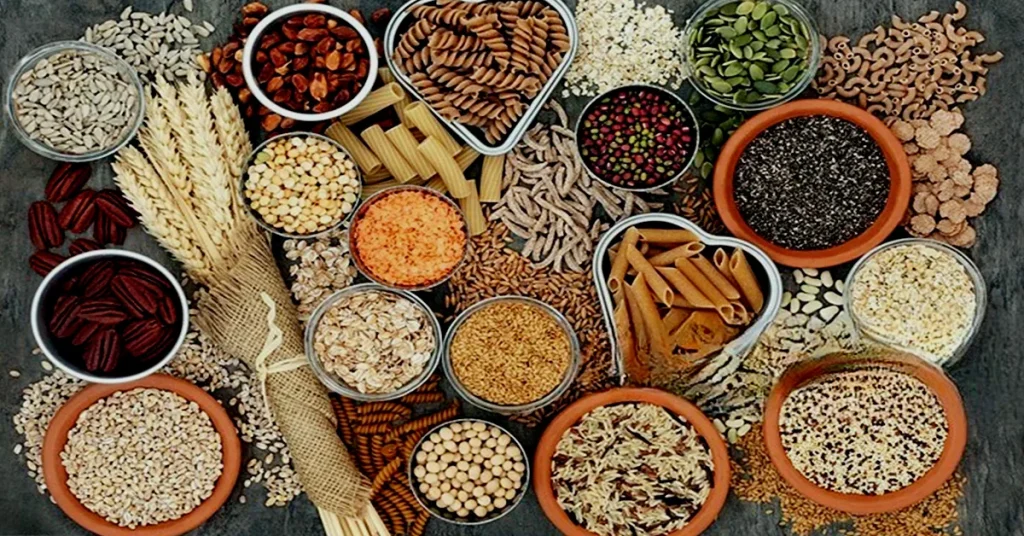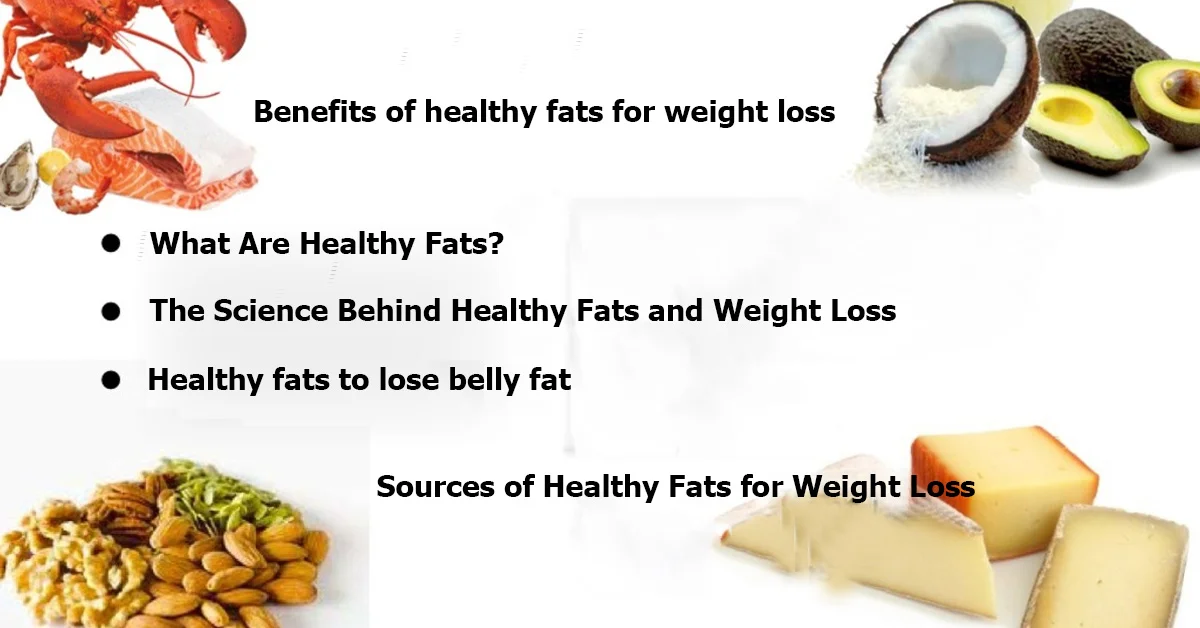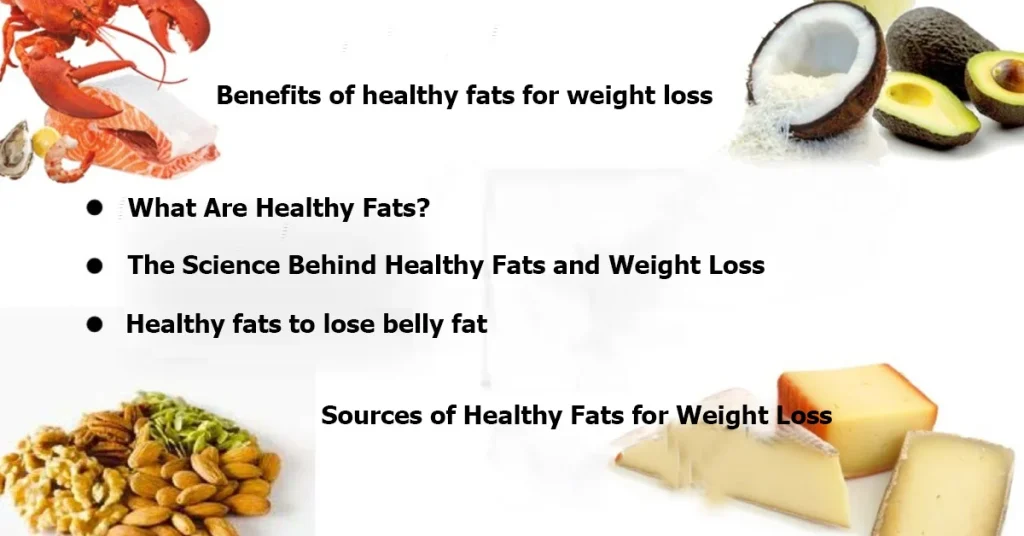Healthy fats are no longer the enemy in the quest for weight loss; in fact, they’re a vital ally. Incorporating the benefits of healthy fats for weight loss into your diet can transform your approach to shedding pounds while maintaining overall well-being.
Unlike refined carbs that lead to energy crashes, healthy fats like those found in avocados, nuts, and olive oil provide a sustained energy source. They promote satiety, curbing cravings and reducing the likelihood of overeating. This effect plays a significant role in calorie control, a cornerstone of weight loss.
Another remarkable aspect of the benefits of healthy fats for weight loss is their ability to boost metabolism. Omega-3 fatty acids, in particular, stimulate thermogenesis, helping your body burn calories more efficiently. At the same time, these fats support hormonal balance, essential for regulating hunger and energy use.
Additionally, healthy fats enhance nutrient absorption, ensuring your body maximizes vitamins like A, D, E, and K. This not only supports your immune system but also optimizes the fat-burning process.
Embracing the benefits of healthy fats for weight loss isn’t just about numbers on a scale—it’s about fueling your body with what it needs to thrive while achieving your weight loss goals.
- What Are Healthy Fats?
- Defining Healthy Fats
- Types of Healthy Fats
- The Science Behind Healthy Fats and Weight Loss
- Key Benefits of Healthy Fats for Weight Loss
- Healthy fats to lose belly fat
- Healthy fats for women
- Healthy fats food List
- Healthy Fats and Satiety
- Boosting Nutrient Absorption with Healthy Fats
- Healthy Fats for Better Gut Health
- Healthy Fats and Mental Health Benefits
- Sources of Healthy Fats for Weight Loss
- How to Include Healthy Fats in Your Diet
- Mistakes to Avoid with Healthy Fats
- Healthy Fats and Long-Term Weight Maintenance
What Are Healthy Fats?
Healthy fats are an essential component of a balanced diet, playing a crucial role in maintaining overall health and well-being. Unlike their unhealthy counterparts, healthy fats provide the body with vital nutrients that support brain function, heart health, and even weight management. These fats include unsaturated fats such as monounsaturated and polyunsaturated fats, which are found in foods like avocados, olive oil, nuts, seeds, and fatty fish.
One of the most significant benefits of healthy fats for weight loss is their ability to promote satiety. Healthy fats digest more slowly than carbohydrates, keeping you full for longer and reducing the temptation to snack on unhealthy foods. They also regulate hormones such as insulin and leptin, which play a pivotal role in hunger control and energy expenditure.
Additionally, healthy fats are essential for absorbing fat-soluble vitamins like A, D, E, and K, ensuring your body functions optimally. Incorporating foods rich in omega-3 fatty acids, such as salmon or flaxseeds, can reduce inflammation and improve metabolic health, further supporting weight loss efforts.
By understanding the benefits of healthy fats for weight loss, you can make smarter dietary choices that nourish your body while helping you achieve your fitness goals. Healthy fats are not the enemy—they’re your ally.

Whole grains and heart health tips that work
Vegetable Soup With Lentils And Beans: Hearty and Nutritious
Defining Healthy Fats
What Are Healthy Fats and Why They Matter
Healthy fats are essential nutrients that fuel your body, support brain function, and maintain heart health. They include unsaturated fats found in avocados, nuts, and fish. One of the key benefits of healthy fats for weight loss is their ability to curb hunger, enhance metabolism, and improve nutrient absorption. Embracing healthy fats is vital for a balanced and sustainable lifestyle.
The Distinction Between Essential and Non-Essential Fats
Essential fats, like omega-3 and omega-6 fatty acids, are vital nutrients your body cannot produce, supporting brain function and inflammation control. Non-essential fats, such as saturated fats, can be synthesized by the body but should be consumed in moderation. Recognizing this distinction highlights the benefits of healthy fats for weight loss, promoting smarter choices for balanced health and sustained energy.
Types of Healthy Fats
Unsaturated Fats
Unsaturated fats, found in foods like avocados and olive oil, are heart-healthy and fuel metabolism. They enhance the benefits of healthy fats for weight loss, keeping you satisfied while supporting overall wellness.
Monounsaturated Fats: Benefits and Sources
Monounsaturated fats, found in avocados, nuts, and olive oil, improve heart health and boost metabolism. They amplify the benefits of healthy fats for weight loss, keeping you full and energized.
Polyunsaturated Fats
Polyunsaturated fats, including omega-3 and omega-6 fatty acids, support brain function and reduce inflammation. They enhance the benefits of healthy fats for weight loss, promoting a balanced metabolism and sustained energy.
Omega-6 Fatty Acids: The Balancing Act
Omega-6 fatty acids, found in seeds and vegetable oils, support brain function and hormone health. Balanced intake enhances the benefits of healthy fats for weight loss, promoting optimal metabolism and vitality.
Omega-3 Fatty Acids: The Brain and Body Booster
Omega-3 fatty acids, found in fatty fish and flaxseeds, boost brain function and reduce inflammation. These powerful fats enhance the benefits of healthy fats for weight loss, supporting fat metabolism and overall wellness.
How Healthy Fats Differ from Unhealthy Fats
The Problem with Saturated Fats in Excess
Excessive saturated fats, often found in processed meats and dairy, can raise bad cholesterol levels. This imbalance hinders the benefits of healthy fats for weight loss, potentially disrupting metabolism and overall health.
Trans Fats: The True Villains of Nutrition
Trans fats, found in processed foods and fast food, are detrimental to health. They hinder the benefits of healthy fats for weight loss, contributing to inflammation, weight gain, and heart disease risk.

The Science Behind Healthy Fats and Weight Loss
Why Your Body Needs Fat to Burn Fat
Healthy fats are critical for accessing stored fat and converting it into energy, enabling efficient weight loss.
How Healthy Fats Influence Metabolism
They enhance thermogenesis, the process by which the body burns calories to produce heat, improving metabolism.
The Role of Healthy Fats in Hormonal Balance
Fats regulate hormones like leptin and insulin, which are vital for hunger control and energy regulation.
Key Benefits of Healthy Fats for Weight Loss
Reducing Cravings and Controlling Hunger
Healthy fats provide a slow, sustained energy release, helping you avoid mid-day snack binges.
Improving Energy Levels for Better Workouts
They fuel longer, more effective workouts by providing consistent energy.
Supporting Fat-Burning Processes
By stimulating metabolic pathways, healthy fats help convert stored fat into usable energy.
Healthy fats to lose belly fat
Incorporating healthy fats into your diet can be a game-changer when it comes to losing belly fat. Foods like avocados, nuts, and olive oil provide essential nutrients that support fat burning while keeping you satisfied longer. These fats also help regulate hormones that control hunger and metabolism. When consumed in moderation, healthy fats can accelerate the benefits of healthy fats for weight loss by reducing cravings and boosting your energy. They also assist in reducing inflammation and improving heart health, which plays a key role in overall fat loss. Embrace these fats to help trim your waistline effectively and sustainably.

Why does eating fat make you lose weight
Eating fat can actually help you lose weight by improving satiety and reducing hunger. Healthy fats, like those found in avocados, olive oil, and nuts, help regulate hormones that control appetite and metabolism. They also provide a steady source of energy, keeping you satisfied for longer periods, so you’re less likely to snack on unhealthy foods. The benefits of healthy fats for weight loss are clear: they promote fat burning, help balance blood sugar levels, and support a healthy metabolism. By including healthy fats in your diet, you can create a sustainable, effective path to weight loss.
Healthy fats for women
Healthy fats are essential for women’s overall well-being and can be a key part of a weight loss journey. Incorporating fats from sources like avocados, nuts, and fatty fish can support hormonal balance, which is particularly important for women. These fats also promote healthy skin, reduce inflammation, and improve brain function. Additionally, the benefits of healthy fats for weight loss are significant. They help control appetite, reduce cravings, and provide long-lasting energy, making it easier to maintain a balanced diet and healthy lifestyle. Embracing healthy fats can be a game-changer for women seeking lasting health benefits.
Healthy fats food List
- Avocados: Packed with monounsaturated fats and fiber.
- Olive oil: Rich in heart-healthy monounsaturated fats.
- Nuts (almonds, walnuts, cashews, etc.): Great sources of unsaturated fats and protein.
- Seeds (chia, flaxseeds, sunflower seeds): Full of omega-3s and fiber.
- Fatty fish (salmon, mackerel, sardines): Loaded with omega-3 fatty acids.
- Coconut oil: A healthy source of medium-chain triglycerides (MCTs).
- Dark chocolate (70% cacao or higher): Contains beneficial fats and antioxidants.
- Full-fat dairy (in moderation, like Greek yogurt or cheese): Contains healthy fats and probiotics.
- Eggs: A balanced source of healthy fats and high-quality protein.
- Nut butters (peanut, almond, cashew): Offer healthy fats and a creamy texture.
Healthy Fats and Satiety
How Healthy Fats Keep You Full Longer
Fats slow digestion, ensuring you feel full and satisfied for extended periods.
The Connection Between Fats and Reduced Calorie Intake
By promoting fullness, fats naturally help you consume fewer calories without feeling deprived.
Healthy Fats vs. Carbs: The Satiety Factor
Compared to quick-burning carbs, fats provide lasting satiety, making them ideal for weight management.
Boosting Nutrient Absorption with Healthy Fats
Vitamins That Need Fats to Work (A, D, E, and K)
These vitamins are fat-soluble, meaning they require dietary fats for proper absorption and functionality.
Why Better Nutrient Absorption Supports Weight Loss
Improved absorption enhances metabolism and supports overall health, aiding in sustained weight loss.
Healthy Fats for Better Gut Health
The Link Between Gut Health and Weight Management
Healthy fats foster a balanced gut microbiome, which is essential for digestion and weight regulation.
How Omega-3s Support a Balanced Gut Microbiome
Omega-3s encourage the growth of beneficial gut bacteria, reducing inflammation and improving digestion.
Healthy Fats and Mental Health Benefits
How They Reduce Stress-Related Weight Gain
Healthy fats regulate cortisol, the stress hormone, minimizing its impact on weight.
The Connection Between Healthy Fats and Mood Regulation
By supporting neurotransmitter production, fats improve mood and reduce emotional eating.
Common Myths About Fats and Weight Loss
Why Low-Fat Diets Often Fail
These diets often lead to nutrient deficiencies and increased cravings, undermining weight loss efforts.
Debunking the Fear of Eating Fat
Education is key—healthy fats are indispensable for a balanced, effective diet.
Sources of Healthy Fats for Weight Loss
Top Foods Rich in Healthy Fats: Avocado, Nuts, and Seeds
Avocados are rich in monounsaturated fats and packed with fiber, making them a perfect addition to meals. Nuts like almonds and walnuts are convenient, nutrient-dense snacks, while seeds such as flaxseeds and chia seeds provide omega-3s and essential minerals.
Cooking Oils That Support Weight Loss: Olive Oil and Coconut Oil
Extra virgin olive oil is a staple for heart health and weight management, offering a robust source of antioxidants and monounsaturated fats. Coconut oil contains medium-chain triglycerides (MCTs), which are metabolized quickly and may enhance fat-burning processes.
Incorporating Fatty Fish and Plant-Based Options
Fatty fish like salmon, mackerel, and sardines are loaded with omega-3 fatty acids that reduce inflammation and support weight loss. Plant-based sources like tofu, edamame, and walnuts are excellent alternatives for vegetarians and vegans.
How to Include Healthy Fats in Your Diet
Easy Swaps to Add Healthy Fats to Everyday Meals
Switch out butter for olive oil, or replace sugary snacks with a handful of mixed nuts. Add sliced avocado to your sandwiches or toss chia seeds into your smoothies for a nutrient boost.
Balanced Portion Sizes for Effective Weight Loss
While healthy fats are beneficial, they are calorie-dense. Use measuring tools to keep portion sizes appropriate, such as a tablespoon of olive oil or a quarter of an avocado per serving.


Mistakes to Avoid with Healthy Fats
Overeating Even the Good Fats
Healthy fats can still lead to weight gain if consumed excessively. Practice mindfulness and moderation to avoid overindulgence.
Choosing Processed Foods Marketed as Healthy
Beware of snacks labeled as “low-fat” or “fat-free,” as they often contain added sugars or unhealthy substitutes. Opt for whole, natural sources of healthy fats instead.
The Role of Healthy Fats in Popular Diets
Why Keto and Mediterranean Diets Rely on Healthy Fats
Both the keto and Mediterranean diets emphasize healthy fats as a cornerstone of their approaches. These diets rely on fats to provide energy, improve satiety, and enhance nutrient absorption.
How to Adapt These Diets for Your Weight Loss Goals
Experiment with recipes that align with these diets while focusing on your unique nutritional needs. For instance, a keto meal plan may include more MCT-rich coconut oil, while a Mediterranean-inspired approach emphasizes olive oil and fish.
Healthy Fats and Long-Term Weight Maintenance
Building Sustainable Eating Habits
Incorporating healthy fats into your meals ensures satisfaction, reducing the temptation to revert to unhealthy eating habits. Focus on consistency and variety to keep your diet enjoyable.
Why Healthy Fats Help Prevent Weight Regain
Fats stabilize blood sugar levels, preventing the energy crashes that often lead to overeating. Their role in hormonal regulation also helps maintain a healthy metabolism, making weight maintenance more achievable.
Good fats and bad fats
Not all fats are created equal. Good fats, like monounsaturated and polyunsaturated fats, nourish the body and provide essential nutrients. Found in foods like avocados, nuts, seeds, and fatty fish, they support heart health and offer the benefits of healthy fats for weight loss, such as reducing cravings and boosting metabolism. On the other hand, bad fats—saturated fats and trans fats—can harm your health when consumed excessively. These unhealthy fats, common in processed and fried foods, may lead to weight gain and chronic diseases. Choosing good fats over bad fats is key to a balanced, healthful diet.
Conclusion
Embracing Healthy Fats for a Balanced Lifestyle
Healthy fats are a cornerstone of a balanced diet, offering numerous benefits beyond weight loss. They nourish your body, fuel your energy, and support overall well-being.
Taking the First Steps Toward Smarter Weight Loss
Start small—replace processed snacks with almonds or drizzle olive oil over your salad. Each step builds momentum toward a healthier, more vibrant you. Embrace healthy fats, and let them guide you on your journey to smarter weight loss and a better lifestyle.
FAQs
Why Are Healthy Fats Important for Weight Loss?
Healthy fats play a crucial role in weight loss by supporting key bodily functions. They help regulate hormones, boost metabolism, and keep you feeling full for longer periods. This reduces the likelihood of overeating and curbs cravings for unhealthy snacks. Healthy fats also enhance the absorption of fat-soluble vitamins like A, D, E, and K, which are essential for overall health. Including these fats in your diet ensures you lose weight while staying nourished.
How Do Healthy Fats Help the Body?
Healthy fats are vital for energy production, cell function, and nutrient absorption. They protect organs, regulate body temperature, and play a significant role in brain health by supporting cognitive function and mood stability. Omega-3 fatty acids, for example, reduce inflammation and promote heart health. These fats also assist in balancing hormones, which can directly influence metabolism and weight management.
What Are the Main Health Benefits of Fats?
- Energy Source: Fats provide a concentrated source of energy for the body.
- Nutrient Absorption: They enable the absorption of fat-soluble vitamins.
- Hormonal Support: Fats regulate hormones crucial for metabolism and overall health.
- Brain Health: Omega-3s enhance cognitive function and emotional well-being.
- Heart Health: Monounsaturated and polyunsaturated fats help lower bad cholesterol levels.
What Are the 5 Importance of Fats?
- Energy Production: Fats supply sustained energy throughout the day.
- Cell Structure: They form a critical part of cell membranes.
- Vitamin Absorption: Essential for absorbing vitamins A, D, E, and K.
- Insulation and Protection: Fats cushion vital organs and maintain body temperature.
- Hormonal Balance: Fats help produce hormones like estrogen and testosterone.
What Are the Best Fats for Weight Loss?
- Avocados: Packed with monounsaturated fats and fiber for satiety.
- Nuts and Seeds: Almonds, walnuts, and chia seeds offer healthy fats and protein.
- Fatty Fish: Salmon and mackerel provide omega-3 fatty acids.
- Olive Oil: A heart-healthy oil ideal for cooking and dressing.
- Coconut Oil: Contains medium-chain triglycerides (MCTs) that may boost metabolism.








